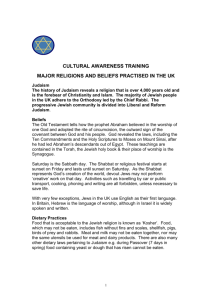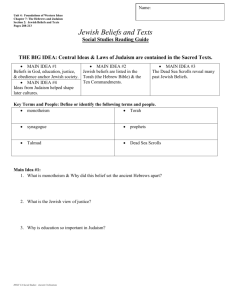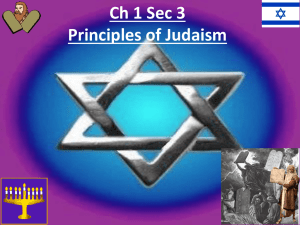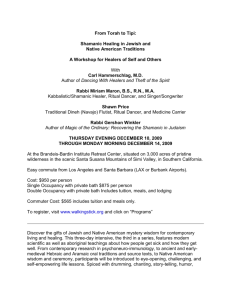The Invention of Hope - The National Institute For Jewish Hospice
advertisement
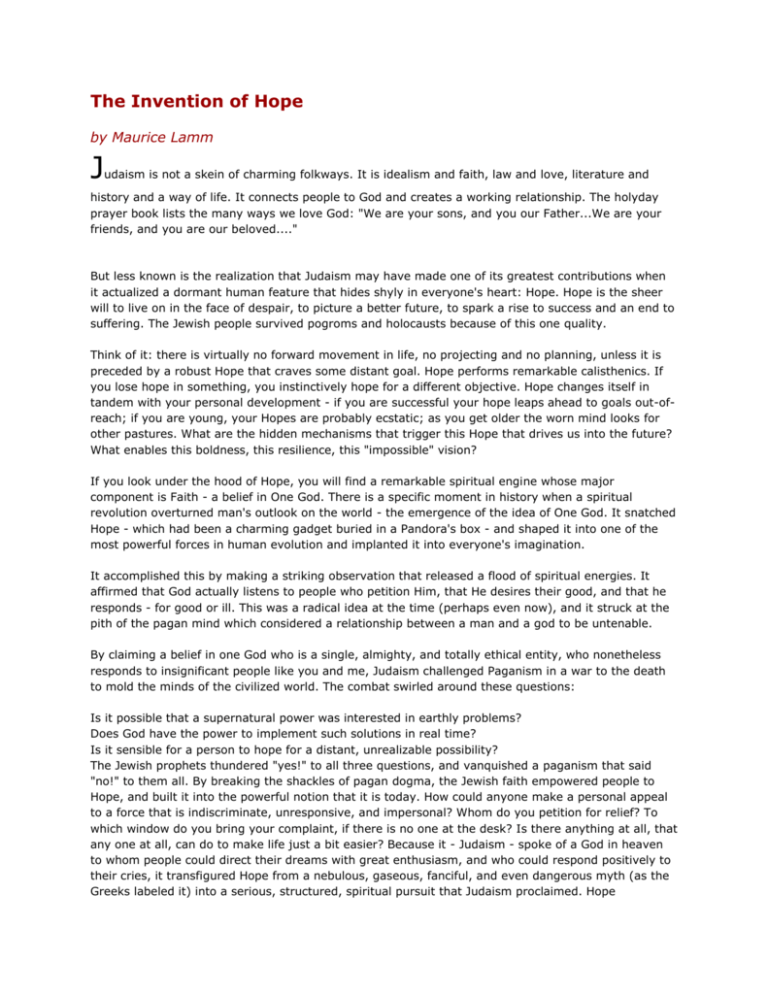
The Invention of Hope by Maurice Lamm J udaism is not a skein of charming folkways. It is idealism and faith, law and love, literature and history and a way of life. It connects people to God and creates a working relationship. The holyday prayer book lists the many ways we love God: "We are your sons, and you our Father...We are your friends, and you are our beloved...." But less known is the realization that Judaism may have made one of its greatest contributions when it actualized a dormant human feature that hides shyly in everyone's heart: Hope. Hope is the sheer will to live on in the face of despair, to picture a better future, to spark a rise to success and an end to suffering. The Jewish people survived pogroms and holocausts because of this one quality. Think of it: there is virtually no forward movement in life, no projecting and no planning, unless it is preceded by a robust Hope that craves some distant goal. Hope performs remarkable calisthenics. If you lose hope in something, you instinctively hope for a different objective. Hope changes itself in tandem with your personal development - if you are successful your hope leaps ahead to goals out-ofreach; if you are young, your Hopes are probably ecstatic; as you get older the worn mind looks for other pastures. What are the hidden mechanisms that trigger this Hope that drives us into the future? What enables this boldness, this resilience, this "impossible" vision? If you look under the hood of Hope, you will find a remarkable spiritual engine whose major component is Faith - a belief in One God. There is a specific moment in history when a spiritual revolution overturned man's outlook on the world - the emergence of the idea of One God. It snatched Hope - which had been a charming gadget buried in a Pandora's box - and shaped it into one of the most powerful forces in human evolution and implanted it into everyone's imagination. It accomplished this by making a striking observation that released a flood of spiritual energies. It affirmed that God actually listens to people who petition Him, that He desires their good, and that he responds - for good or ill. This was a radical idea at the time (perhaps even now), and it struck at the pith of the pagan mind which considered a relationship between a man and a god to be untenable. By claiming a belief in one God who is a single, almighty, and totally ethical entity, who nonetheless responds to insignificant people like you and me, Judaism challenged Paganism in a war to the death to mold the minds of the civilized world. The combat swirled around these questions: Is it possible that a supernatural power was interested in earthly problems? Does God have the power to implement such solutions in real time? Is it sensible for a person to hope for a distant, unrealizable possibility? The Jewish prophets thundered "yes!" to all three questions, and vanquished a paganism that said "no!" to them all. By breaking the shackles of pagan dogma, the Jewish faith empowered people to Hope, and built it into the powerful notion that it is today. How could anyone make a personal appeal to a force that is indiscriminate, unresponsive, and impersonal? Whom do you petition for relief? To which window do you bring your complaint, if there is no one at the desk? Is there anything at all, that any one at all, can do to make life just a bit easier? Because it - Judaism - spoke of a God in heaven to whom people could direct their dreams with great enthusiasm, and who could respond positively to their cries, it transfigured Hope from a nebulous, gaseous, fanciful, and even dangerous myth (as the Greeks labeled it) into a serious, structured, spiritual pursuit that Judaism proclaimed. Hope illuminated the distant horizons of a dark world. The 19th century Christian existentialist philosopher, Søren Kierkegaard, believed that this commitment to Hope, "…made the Jewish religion, of all religions, outspoken optimism. Greek pagan thought is optimistic, but is tinged with deep melancholy, and had no Divine sanction. Judaism is Divinely-sanctioned optimism, sheer promise for this life." It could not be otherwise. A religion that taught the world that every person is created in the image of God had to be optimistic and hopeful. If we are spiritual facsimiles of God, we have the power to be creative, as He is, and we can strive to modify or eliminate suffering, tragedy, and evil of all kinds. By stimulating people not to accept evil passively, and encouraging them to do combat against the horrors of life, faith in God became a source of great Hope. Religion told the ancient world that when things are bad, we can reasonably hope for a new beginning. This revolution translated beliefs into practical propositions. To the man on the street this meant that he had an address to whom he could appeal when he was in trouble, even if it was in heaven. It meant that God could, and very well might, respond with help - perhaps a new cure or a new opportunity. Immediately, the earth became a friendlier, cozier, more hospitable place in which to spend a lifetime. If paganism had succeeded, the quality of Hope built into every human being would have been useless, the spiritual tonsils of the human imagination, benign but ineffectual - a joke in the throat of man's desperation. The One-God revolution made radical breaks with Paganism that swiftly transformed man's thinking, but the spark that began it all was Judaism's belief in One God who created the world with design, purpose and meaning. It chose personal destiny over random fate. The Greeks believed that whatever happens to a person is entirely the result of random forces. If disease strikes a person, it does so by sheer coincidence. Victims of a disaster are simply "accidents," not subjects, of history. Whether you love or hurt your neighbor, whether you abuse your wife or respect her, whether or not you defraud your business partner, are matters that have no bearing on what befalls you - because nature has no master design and no master designer, no purpose and, therefore, no meaning. Life is a collection of random events. Good luck. This is the reason whole pagan societies like Mesopotamia historically were shot through with depression and anxiety. If you were a Mesopotamian, how could you make sense of your life? These doubts were the seeds of hopelessness that characterized Greek tragedy. That is why the overwhelming majority of thinkers in pagan Greece and Rome, in poems and plays, mocked the idea of hope and called it a fairy tale. These illustrious cultures brought the world a cornucopia of aesthetics, poetry, logic, and philosophy -but they robbed humanity of a rudimentary element of living that sustains people every day of their lives. The Jewish idea of One God, however, was a shaft of light that shone through the thick clouds of Pagan culture and radiated the idea that the world is actually good, despite rampant suffering; that people are actually people, not discarded debris tossed helter-skelter on the turbulent ocean of history, subject not to a random fate, but to Divine destiny. The belief in One God ultimately dominated all civilization and paganism quickly began to fade. Hope instantly sprang into existence, creating a new reality. Monotheistic religion became the cradle of optimism, while Paganism suffered fits of melancholy until finally it collapsed. Could the Jews have lived through the twentieth century without Hope? How could Jews have survived their children being clubbed to death by storm troopers? Only with Hope. Elie Wiesel found a sign over the doors to the Breslav synagogue in Warsaw that read "Gevalt Jews! Don't give up." How curious to feel the flesh of hope in today's events. A thousand years ago, Christian crusaders incinerated our children, our homes, and our synagogues. At the end of this Christian millennium, Cardinal O'Connor of New York wrote a letter that is a historic document. It is a Rosh Hashanah greeting to Jews - an apology for the misdeeds of the last thousand years, saying that his people repent, "do Teshuva." He prays for a longer Jewish-Catholic embrace and wishes us Shana Tovah. We raged against the dying of the light, we hoped against hope, and we succeeded. The word, Hope, is Tikvah in Hebrew. Is it coincidental that "Hatikvah" is Israel's national anthem? If we look at the bottom line today, at the end of our secular millennium, we can say proudly and confidently that our faith in God gave us Hope and that our Hope sustained us. Thank God. Rabbi Maurice Lamm is an internationally renowned author, President of the National Institute for Jewish Hospice and Professor at Yeshiva University's Rabbinical Seminary in New York. He was the rabbi of Beth Jacob Congregation in Beverly Hills from 1972 until his retirement in 1985. Rabbi Lamm's latest book, The Power of Hope, was recently translated into Spanish, Greek and Chinese. His most popular work, The Jewish Way in Death and Mourning, is considered one of the seven best Jewish books by the New York Times. Rabbi Lamm is also author of The Jewish Way in Love and Marriage, Becoming a Jew and Living Torah in America. National Institute for Jewish Hospice 732 University Street North Woodmere, New York 11581


